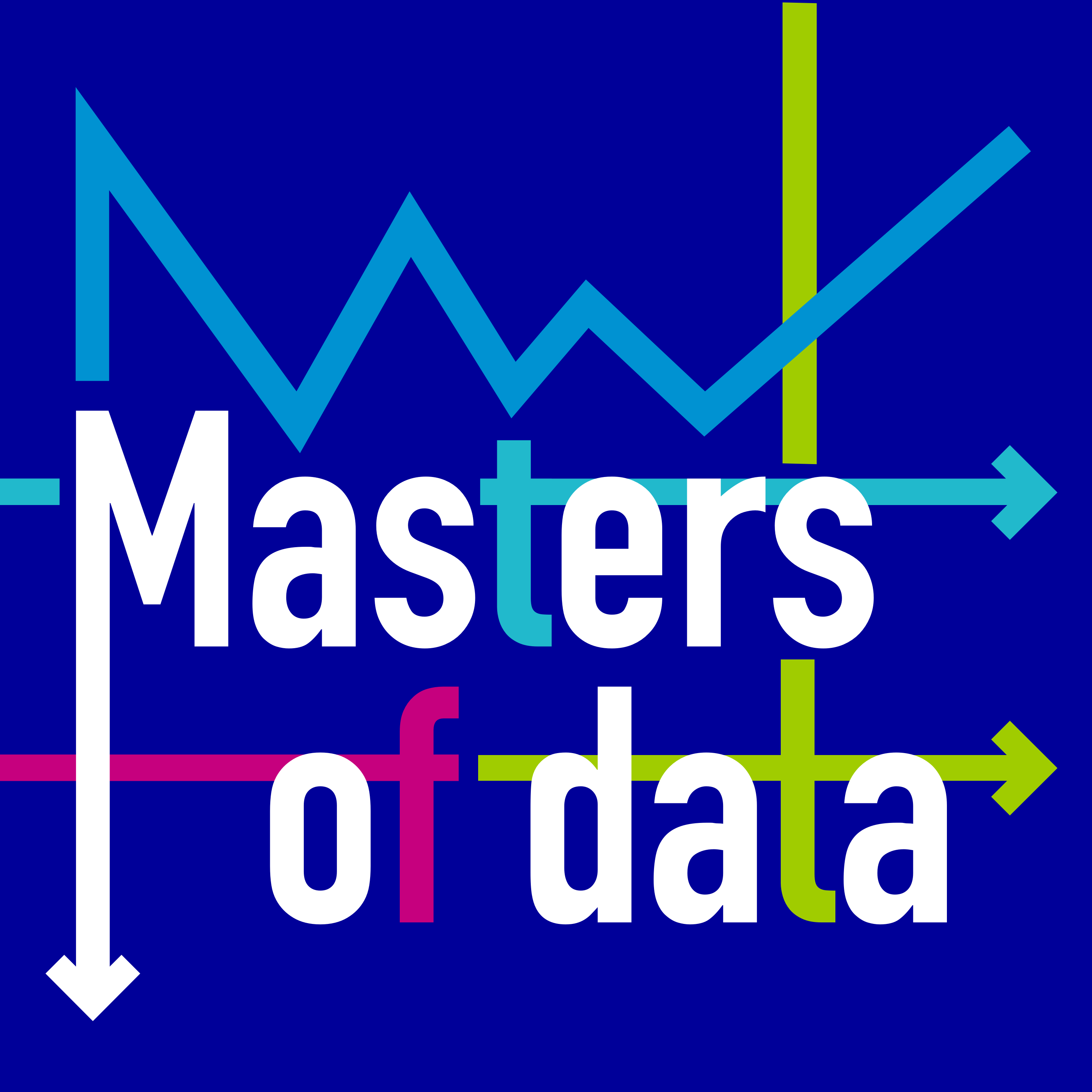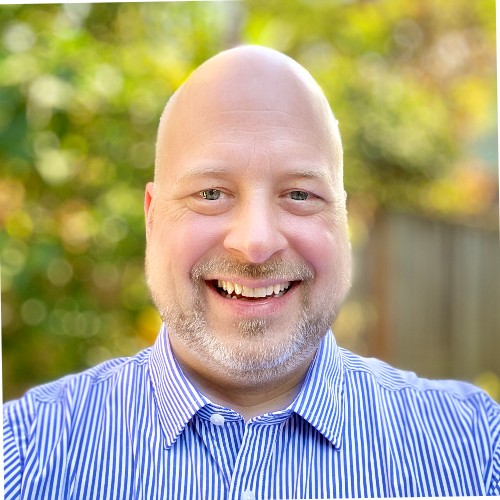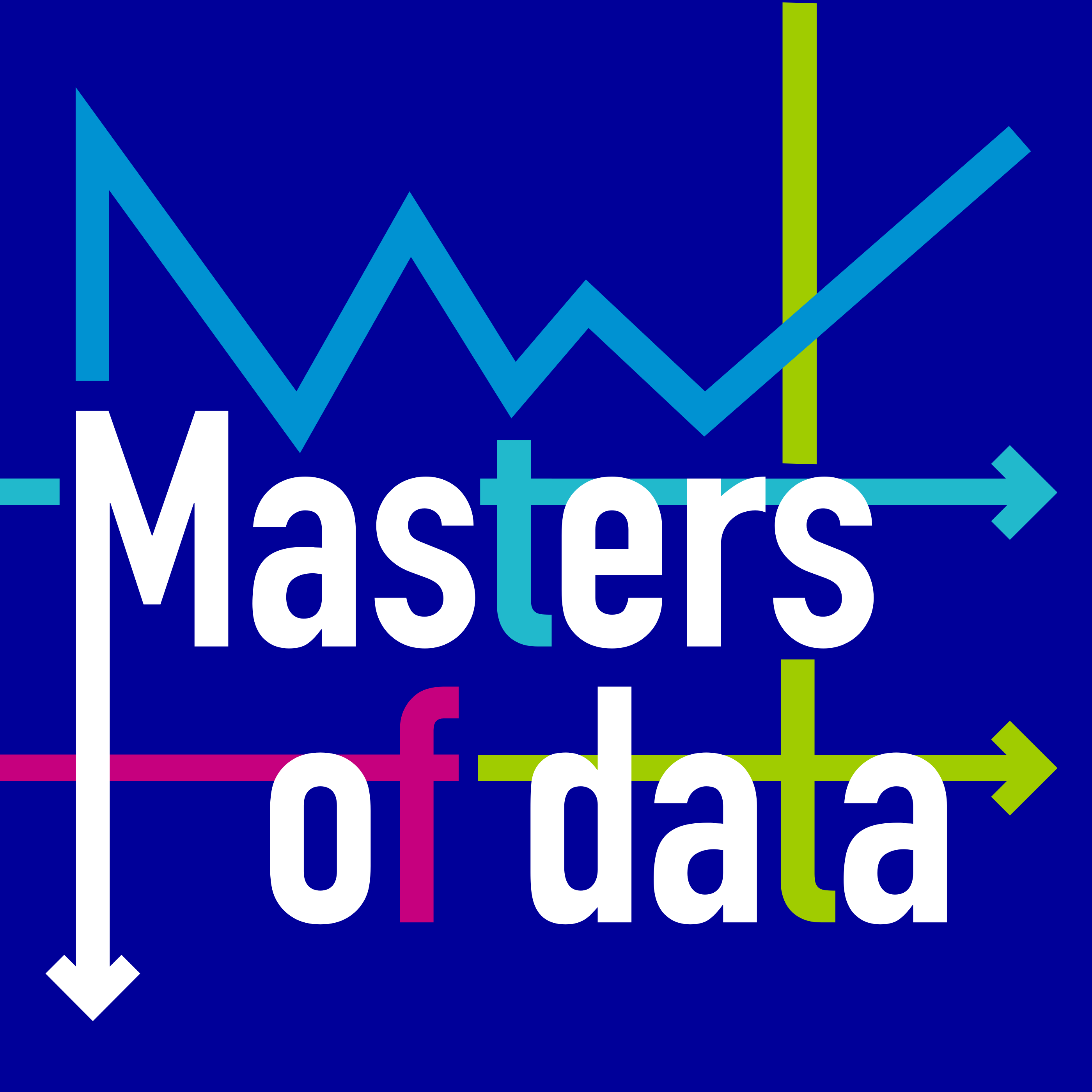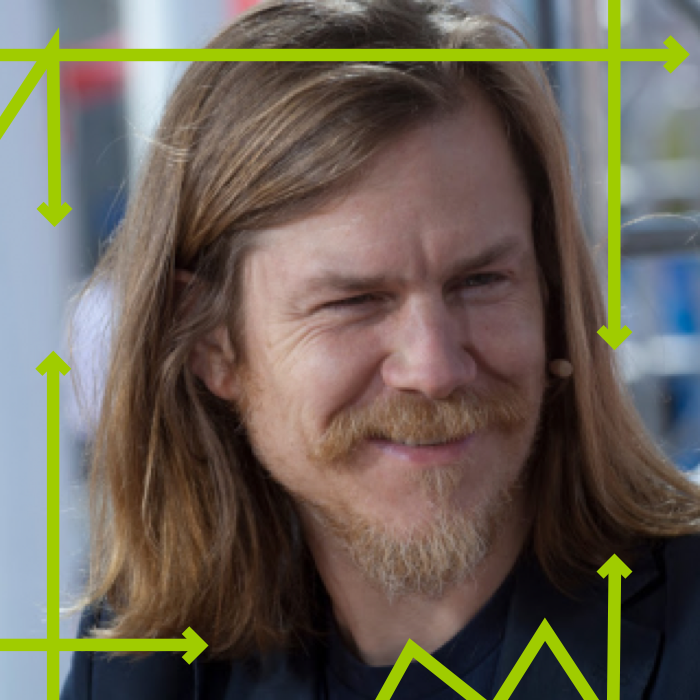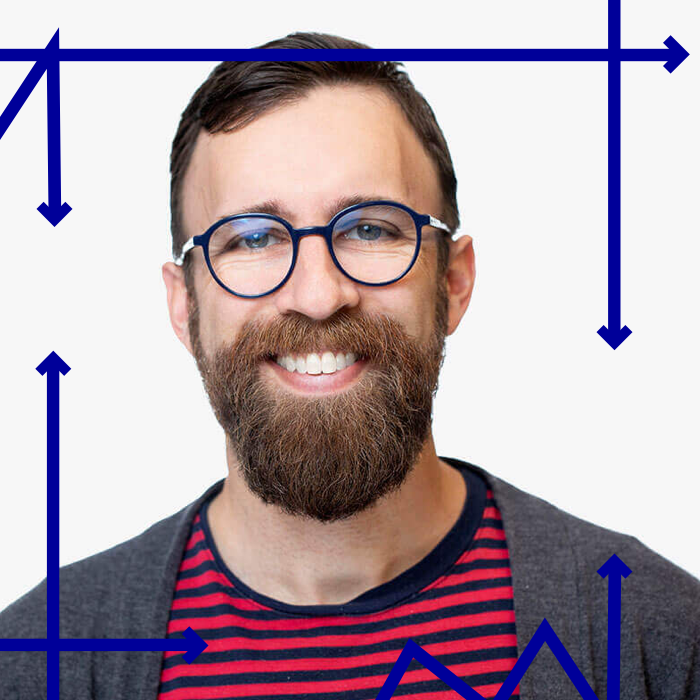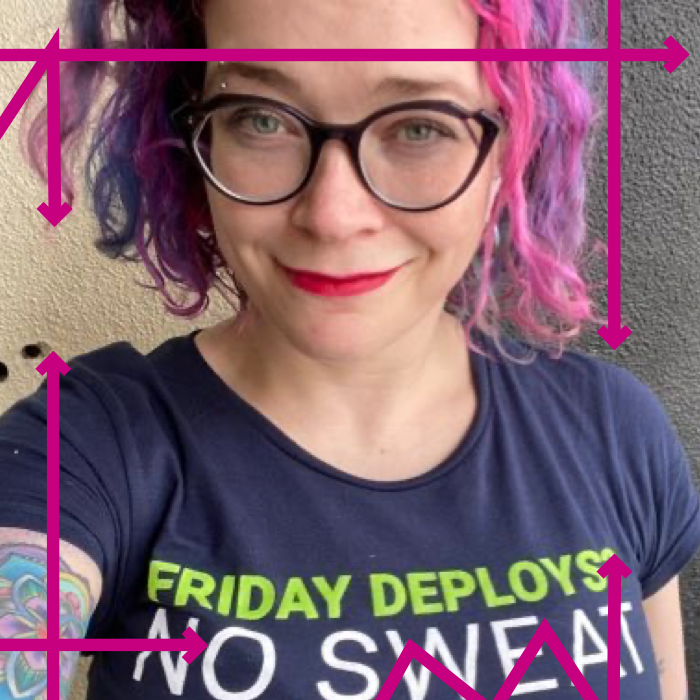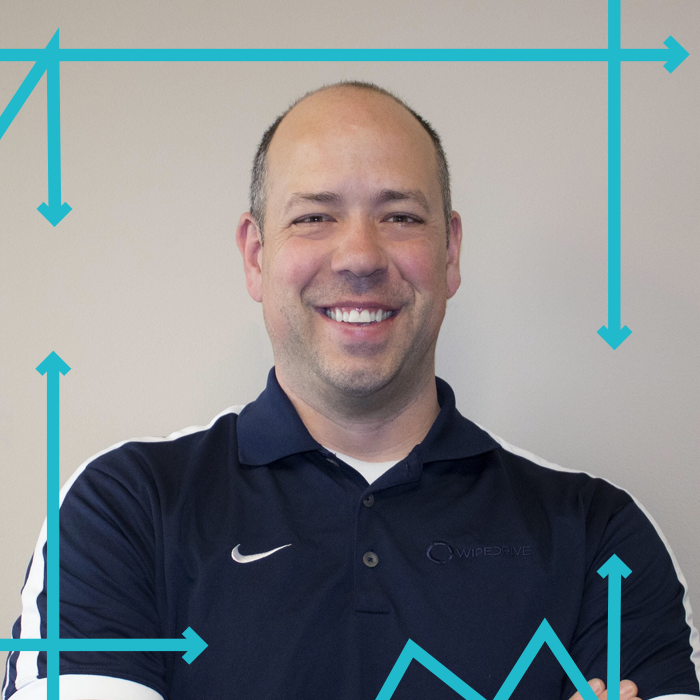How iRobot uses Data Science to Innovate (Guest: Angela Bassa)
- 0.5
- 1
- 1.25
- 1.5
- 1.75
- 2
Ben Newton: Welcome to the Masters of Data podcast, the podcast where we bring the human to data and I'm your host, Ben Newton. Our guest on this episode, Angela Bassa, hails from one of the most innovative robotics companies on the planet, the aptly named iRobot. The creators of the iconic Roomba vacuum robot. Angela is the director of data science at iRobot and talks to us about how it recent product announcements [inaudible 00:00:29] more than just product innovation. Their new iRobot 2.0 platform is a new approach to how they build robots, software, and also the place of data science at iRobot. So without any further ado, let's dig in. Welcome everybody to another episode of the masters of data podcast and I am very excited about my guest today. She comes from a company that I've admired for a long time, iRobot. And welcome on to the podcast, Angela, and thank you for coming on.
Angela Bassa: Thank you for having me. I'm really excited to share the stuff that we're working on.
Ben Newton: Absolutely and we were talking about some of the exciting stuff that you guys are doing. I'm excited to have you talk about it. Angela Bassa, she's a director of data science at iRobot and so she's obviously got her hands into some really interesting things. Now, how we usually start off Angela, Id love to just take a couple minutes to give everybody a little bit of background on you. How did you end up in data science and how did you end up at iRobot? What's the path that brought you here?
Angela Bassa: I think the one thing that makes it a standard path is just how nonstandard it was which is something that's pretty common among practitioners of the data dark arts. I actually came into data science from the math background. There's sort of a dichotomy from people who come into it from the software development side and people who come into it from the math and analytical side and that's where I came from. So, I have a lot to learn in terms of software development and engineering. So, I was an individual contributor way back when, getting my hands dirty with data and understanding the pain of being the person ensuring the validity of the data product that you're working with to know that the outcomes mean what you think they mean. So that's a lesson that I have near and dear to my heart that I try to impart on my teams as well.
Angela Bassa: I did a lot of work with medical data, clinical trials data, pharmaceutical development data, which branched a little into medical devices, and agricultural, and egg tech for awhile there. Then I transitioned into more marketing territory. That's when I discovered the vast troves of data that are collected about us as we traverse the interwebs. So, that's also when I shut down a lot of my social media presence. Then I have just one channel that I focus on right now that is a little bit easier to control and have a mental model around. And then now I'm mostly useless, I'm management.
Ben Newton: What's that one channel, by the way? Is it MySpace or like what are you?
Angela Bassa: Right? Yeah. Tom is my buddy. So I am pretty active on Twitter. There's a strong bit of scientific community on Twitter that if you can block all of the garbage noise it's actually really quite useful.
Ben Newton: All right. Well I'm going to invite you back on to have another podcast about how to block the garbage noise cause I still don't know how to do that. You know it's really interesting. I love hearing people's backgrounds cause now having interviewed quite a few data science people for the podcast in particular the one thing that is common is that their backgrounds are not common. There's a lot of different strands. They came from physics, or they came from mathematic, or they came from computer science. It's somewhat reminiscent of what I've heard about the early days of computer science is that as the field was growing people, almost nobody, there were no computer science programs. And so, it seems like a lot of people like you they come from something else and they fell into it, fell in love with the subject and now that's what they're doing for their career and I think that's pretty cool.
Angela Bassa: Absolutely. And now as a hiring manager I get to see it from the other side. So, as I put teams together. Folks on the team today, we have somebody with a marine biology background who understands the literature of teaming because pods of dolphin are coordinating. And they can't really tell us what it is that they want to do they just leave artifacts in their wake. And the human analysts are looking over that and inferring things from it which turns out super useful in robotics. But you know, we don't have to reinvent the wheel. That literature exists and we can cross pollinate.
Ben Newton: That's really cool.
Angela Bassa: We have talent on the team that's heavily statistical. So, we don't need to focus just on big data and not worry about causality because enough correlation is sufficient for our needs. No, we have somebody who can deal with small data and infer causality in that sense. We have mechanical engineers and it runs the gamut. So, I totally get the sense that we are about where computer science was maybe 20 30 years ago where we're still, different teams, a storm form and norm. And I think we're just in the stormy like ending there.
Ben Newton: That is great. And for the two people that are going to be listening to this that haven't heard of iRobot, you and I were talking before and I had no idea that iRobot was a 30 year old company. But I mean tell me, just give us a little, the high level about what you guys do. What is iRobot's mission?
Angela Bassa: Yeah. It's almost 30 years old. So, it started with some roboticists out of MIT and there's a long history of different approaches that the company took. There was a heavy presence in remote robotics and telepresence robotics. So, how can you have hospitals in rural areas be able to treat the kinds of situations that patients might come in when you don't have experts at every hospital? So, bringing in that expertise into the operating room of rural remote hospitals was one of the first types of applications that iRobot was involved in. Later on that became commoditized so it didn't really make a lot of sense to have that embodied in a physical telepresence autonomous vehicle. You can do that with tablets and whatnot now.
Angela Bassa: There was also a strong presence in the military realm with autonomous vehicles that could explore areas for ordinance removal or things of that nature. So, you don't have to send humans into a dangerous environment that might blow up. So, you send a machine that if it blows up, it's a bummer we really like our robots. But at least it's not tragic in the same sense that it would be to lose human life ever. And also, the Roomba is sort of the flagship product. It's the thing that most folks know us for. But just last week actually we released a brand new Roomba.
Angela Bassa: We also released a brand new Brava Jet, which is the mopping robot. And it's really, really cool because these robots now can do what we call teaming so they can coordinate with each other. So, the vacuuming robot can take a pass at a particular location in your home. And once it's done it can tell the mop that it's done and that the mop can go there. And so, the vacuum can go to a different room while the mop is going to that first room. And just the whole home gets cleaned without you ever having to lift a finger. And these robots also have docks and so the vacuuming robot docks into the clean base, which then cleans the bin of the robots. So, you could actually go weeks or months without ever having to touch those robots, which is really exciting.
Ben Newton: Maybe it's just my imagination but you're explaining this and I'm like, "Oh, so this is when the robot overlords first start to learn to work together." It's going to be like Skynet or something. Like, remember back or when ....
Angela Bassa: I'm hedging my bets. So, I have a little boy and he's starting to learn how to speak and his first words were "Da da." And his second word is, Bobot." So, I'm definitely getting him ready for whatever's coming.
Ben Newton: Yeah. Do these new robots have a babysitting mode where you can just?
Angela Bassa: I am gunning so hard for that. I'm lobbying internally very hard because my son loves, loves the robot.
Ben Newton: That's really great. And so, when you and I were chatting a little bit before you had talked about this whole coordination thing and I expect that that's particularly considering what we're talking about here that's not easy. When you say it, it's like, "Oh well of course coordination." But I mean I expect that that's a pretty sophisticated thing you guys have pulled off both in terms of technology and how they're exchanging data. I mean, how does that actually work? How are they communicating and coordinating with each other and what does that look like?
Angela Bassa: One of the challenges that we have is that just like a really competent ice skater when they do like a quadruple axle or whatever it is. Because I'm ignorant in ice skating so maybe I should have picked a better metaphor. But regardless, when they do those amazing jumps and it looks so easy and then you go on the ice and you're like, "Ah, how hard could that be?" And you fall on your behind. We're trying to abstract a way, we're trying to simplify the execution of these tasks as much as possible so that our customers don't have to lift a finger and it seems automatical from their end. But you're right. What that means is that on our end it's extremely complicated, especially because we want to make sure that we take care of all of the edge cases and we take care of all of the things that different environments in the wild have that is really hard to test for.
Angela Bassa: So the way that this particular teaming works is we've had to discharge a lot of tech debt, essentially is what it comes down to. So, with a company that's you know, 25 30 years old, there are a lot of baked in assumptions and code that is keeping the lights on that is really hard to transition out of. There's a lot of passion that's built into those code bases. There's a lot of expertise and institutional knowledge that it's not easy for anybody to lift their hand and say, "Let's just nuke it and start fresh." But in some senses that's needed. And so, we've shifted a lot of our code base to Python. We have a new shared software development platform and a new design language that goes across product lines.
Angela Bassa: And so, we've made this investment to enable a platform so that we can have reuse, and we can have multiRobot architectures, and we can have modularized components. So, things like navigation, things like all of these different components that talk through across the different robotic platforms is really part of what's enabled this. And the other part is the cloud infrastructure and the DevOps culture that we have in addition to the ability to produce data and share that data through the cloud and then have that data be used in coordination for the accomplishment of these tasks. So, there's this whole multilayered approach to making this possible. But the thing that's really, really driving this is the fact that it accelerates us. So, it enabled it now, but it'll enable us to go even faster going forward.
Ben Newton: And when you and I were chatting I mean one thing that came. So, you talked now not only about these devices, but you used a term iRobot 2.0 and it was a big thing that you were talking about, was this was more than just an up rev of all the technology. You guys were changing the way you approach it. So, it sounds like it's as much a kind of a cultural teaming change as it is a technology change. Is that right?
Angela Bassa: Yeah, it is. I think so. I think iRobot started as a hardware company and a little while ago it became obvious that software was a coequal partner in the ability to solve robotic problems. And now, what we see is that iRobot is becoming a data company. Not in a sense where the data is the thing that is valuable to us that we're going to make money off it, but no it's the thing that enables us to deliver on that robotic promise. And so, all of the things that we do, we do with the permission of our customer. Privacy is built into the fabric of how we architect our systems, how we utilize this information, and who we utilize this information with. So, we are making our own customer care interactions smarter, we're making our own product development more mindful and more targeted. We are improving the experience that our customers have when they use our products, but one thing that we're not doing is jeopardizing that trust. Because our customers are bringing us into their most hallowed space, right? They're bringing us into their home and so we want to be extremely mindful of that.
Ben Newton: Well you know, it's interesting that you bring that up because that's come up with a couple ... I think everybody when they think of this trust thing they're immediately come to mind Facebook or something like that. But I think this idea that I was talking to one of the founders of Samsung Smart Things and he talked about this idea of trust is coming into the private space and I think that, it's really interesting. Because in some sense I would say that the companies like iRobot that are making these in-home devices, that's much more top of mind than it might be for some of these other things. Because literally, like you said, you can control your social media presence, some of these things, but you have a robot wandering around your house. That's just a whole different level of trust that you don't always think about.
Angela Bassa: Yeah and we think about it. We think about it all the time. I mean the smart home, when we think about that as the ultimate bet, it's going to be enabled by trust, right? It's going to be the partners that our customers are going to choose to continue to partner with like iRobot are the ones who hold that trust very carefully and we understand what our role is in that partnership. And so, when we analyze information that's made available to us, we do that with the permission of our customers and we do that with informed consent. We do that with our customers being aware of how that information is going to be used to what purpose and to what extent. And they're able to stop sharing that information with us whenever they want to. And that's something that's important to us. It's important to me. It's one of the reasons I chose to come work here.
Ben Newton: No, that's really cool. And what does that interaction actually look like? So, does this mean that it's kind of like when you first start using the robot or is it all about like the interaction that they have on a regular basis with the software? I mean, what does that actually look like?
Angela Bassa: I mean, yes and right? So, one of the really exciting things that our new platform enables for us is continuous deployment of features, data exchange and over the air updates. So, we can roll out features, we can get feedback on how those products are getting used over and over. We can feed that back into the development of these robots so that our products get faster and then we can OTA again and we can continue to iterate and continue to learn. And so, we have a piece of hardware that's already in use and that piece of hardware is getting smarter over time.
Ben Newton: No, that's, I mean it is really exciting. And I mean when you talk about this as well, it seems like a key part of this is how the data science function plays into this. Because, one thing I've ... I'm definitely really interested to see how you think about this. Is that I've seen a couple of things come up recently where you see data science is moving from just like research projects where it's like somebody either on a research team or in a university is like, "Oh I did x and it was really cool." To moving where data science is actually doing things that are really have an impact literally in people's homes. But that brings a whole new set of challenges of how you organize those teams and how they think about the roles and the different types of roles. So, as you've been building this team out and now with the reorg you guys have done internally, what does that actually look like functionally in terms of the people and how they collaborate what does that actually mean?
Angela Bassa: Yeah. So, this is something that I hear from a lot of my peers as well where different organizations and I'm speaking mostly in terms of organizations that are not data scientific at their core or at least not yet. So if you have a product that is the result of data science, it's a different ballgame. But if you have an established product or you're participating in an established market and you're trying to infuse data science into your process to improve your results that's going to require some serious cultural change because if the culture was there already then you wouldn't need to bring this level of the illiteracy in. And so, that's one of the things that iRobot has recently done. So we underwent this reorganization to really accelerate our product deliverable process.
Angela Bassa: And one of the things that happened is here at iRobot data science used to be part of the information technology organization in IT which was under finance. And this is very similar to a previous role that I had building a data science team where that was in financial operations as well when I was at a previous company called EnerNOC. And that's pretty typical if there is a typical path, which is usually the folks who recognize the value of something like this. And they may not have all of the different pieces to be able to evaluate talent to be able to evaluate the bet. But they do see that sort of scaling pennies there's something here, right? And it's usually the folks in finance, financial operations, IT, that sort of recognize the potential there. And so, my philosophy has always been, and I started at iRobot about two and a half years ago, and my philosophy is that you need to demonstrate the results on that investment because the investment is substantial.
Angela Bassa: I mean these are incredibly talented folks and they use a lot of data and that data to exfiltrate and traverse through the underlying cloud architectures can get pretty pricey. I mean, just talk about somebody who forgot their compute instance running over the weekend. So imagine doing that with millions of bots over the world.
Ben Newton: Right.
Angela Bassa: So it is a substantial investment and it is something that a lot of executives are taking a leap of faith on because of the industries that they're in. It's not something that's part of where they came from, but they see the potential. And so, you have to convert that potential into kinetic energy really quickly because it's easy to lose those stakeholders. It's easy to say, "Listen, this is a Moonshot, this is a long-term bet." And then folks get bored because it takes a while to see the results of that investment. So my philosophy is you need to take on the foundational work to enable real results. Two, three years down the line, sort of on the, you know, horizon two timeframe you need to have low hanging fruit that you're working very hard across all of the different teams to identify so that you can tackle and you can demonstrate the competencies of the team. You can demonstrate the capabilities.
Angela Bassa: I mean these folks that bring in data science sometimes don't even know what's possible. They don't even know what they can dream of. They don't know how to articulate the questions. They know that they have questions that should be answerable based on the information that we're collecting. But that's what we're there for to solve that. And so, having that in the first horizon to really knock it out of the park and maintain that excitement, maintain that momentum, not let that shrivel up. And that's really what enables the long-term bets. If you can knock out the low hanging fruit with nothing sophisticated, something that's fit for purpose, something that's scalable, something that's maintainable and that delivers results immediately upfront. And you're starting to lay the foundational work that will allow long-term bets to not be crazy, to be measurable, and to be things that you can pitch. Because you have an idea of how those things are going to get accomplished. That's really what opens up all of the doors for true cultural change.
Ben Newton: No I love the way you describe it. And, I mean, going back to something you said so does this mean that data science is now, have you guys fit into a role that's closer to engineering, or are you still in that it bucket, or where does that fit?
Angela Bassa: So, the way that it worked is the IT organization remained in place obviously because everybody that's fallen still needs to run and everybody still needs computers to do all of these things. And our IT team is an expert team that knows how to make sure that the enterprise's pulse is constant. And the part that was focused on the underlying infrastructure for running our products got separated and joined the R and D organization. And so, that's where data science lives now. And we're almost at the intersection of engineering and product management and helping make that interface.
Ben Newton: One of the reasons why I asked about is that I think that that seems to be an overall trend. Because I literally, a completely different area. But somebody reminded me again cause they tweeted something out about Lockheed Martin, like the skunk works and then I've seen it a couple of other places where it's just general ideas. If want to have innovation you've got to get some of these people closer together. You can't expect innovation when people are separated organizationally or even spatially physically is that you have to put these people in the same space where they start to understand each other. The whole thing you were talking about dreaming up new ideas that doesn't happen organically if people aren't close, they have to actually be in proximity to each other. Does that ring true with you?
Angela Bassa: It does. It does. And for us, I mean we get to cheat here at iRobot because we have physical robots and so we need people to be here to touch the hardware. And so, we're able to sort of leverage the fact that that is the baseline. There is a piece of hardware that needs to get worked on, it needs to get tested. And so, it’s easy to explain why people need to be together working together, which then enables all of the network effects that you're describing. I do think there's a place for that to happen in remote work but it has to be super intentional. Whereas if you're not being intentional about it, if you're not setting folks up for success from the get go, then it's easy to cheat when you have an exogenous need for everybody to be together. You can just foster that organic component by getting the hierarchy done right. And the whole point of this reorg was to do away with hierarchy, not in a holacracy externally imposed way but to create network effects. Like let's have this R and D organization that empowers the decision makers as far down as possible so that the great ideas can start bubbling up rather than being imposed to top down.
Ben Newton: I like that. You threw a word exogenous, I can't even pronounce it right. What does that mean?
Angela Bassa: Exactly. So things, I'm sorry I ...
Ben Newton: No that's great. No. I love it. Is not usually that somebody throws a word at me. I'm like, "I don't remember what that means." That's great.
Angela Bassa: So things can come from within the topic of discussion or they can come from outside. So an interesting way of thinking about this is when you think about your own motivations. So, you can have endogenous motivations those that are intrinsic motivations, those that come from within and exogenous motivations or extrinsic motivations those that come from the outside. And so, an extrinsic, an exogenous motivation can be salary or it can be the ability to be known outside of your domain space. The intrinsic motivations are the things that drive you, the things that come from inside, like your drive to know things, your drive to solve problems.
Angela Bassa: And so, I like to think, I mean I made a pithy joke earlier that I'm useless because I'm management but that's the thing that drives me that's the thing that I love. Having been an individual contributor, having earned accolades, having worked with fantastic people, the thing that I love being a manager today is seeing how you can "program humans." Which sounds manipulative and Machiavellian but that's not how I mean it at all. I just mean that when you're coding, obviously things go wrong. It's not super deterministic. But there's a finite space of possible outcomes that you can sort of operate within. With humans, it's a completely different ballpark and so I really enjoy the challenge of getting people to want to solve a problem.
Ben Newton: Well, I think when you say program humans, the future robot overlords would be pleased with you Angela.
Angela Bassa: Don't tell though. That'll get me in trouble.
Ben Newton: It's total tangent, but I like tangents on this podcast. But it's funny I was looking for games for my phone the other day and there's this game out where you're basically coding inside the game. It's essentially almost machine language basic coding to do all these tasks. But you're actually programming humans in the game to do the task. Instead of programming a computer to do it the robots are taking over and now you're programming humans to do basic tasks. There's some truth in there.
Angela Bassa: I'd like to think my team is programming me more often than not, if I'm honest. This is bi-directional. Yeah, let's not lie to ourselves.
Ben Newton: So Angela as I've talked to a lot of different people in the area and I've had a lot of conversations about this recently. It's like we talk about productizing data science or really taking again data science from like just being the domain of pure data scientists to being part of these like bigger organizations. Have you seen new roles that you're having to develop and build on your team to support that? I mean like data engineers, data operations people. How is that working out for you guys?
Angela Bassa: Yeah, I think that's a great question. It really depends where on the maturity cycle a particular team is and what the objective of that team is within the organization. So, for a startup you're going to have a very different set of objectives than you will for a well-established commercial player and that's going to be very different from a nonprofit or a government entity trying to leverage data. So, one thing that for us is really important is while the data scientific aspect of our team was nascent, was very young, the rest of the organization was actually quite mature.
Angela Bassa: And so, we didn't have a lot of the benefits that we might've had were we in a startup where everybody is still trying to figure out how to leverage the different things that they have access to. So, I think the thing that's transferable to learning here is when you have a very young team and you're really focused on the near term horizon of identifying the low hanging fruit and knocking it out of the park to keep the excitement going across the organization as you're laying the groundwork for larger, bigger, more strategic and structural bets. I'm a big fan of having extremely diverse teams, not just in terms of their academic background, or their experience, or expertise, but also their formative experiences. And so, you want your teams to reflect the humans that you are going to be serving.
Angela Bassa: So, for us, we want our team to reflect the customer population of our robots because we want to be able to ask the right questions. We want to ask the questions that our customers are asking. We don't want to ask the questions that nerds like me want to know. I have a very specific set of things that I would love our robots to have, which you know, big whoop. If we did that we go bankrupt because there's one of me and there's millions of all of us. And so, we want to make sure that we are asking questions and we are designing robots in a way that reflects what all of our customers might be looking for. And the question there is, what is the inflection point when that level of specialization starts playing a big role? Because you have to grow to that size.
Angela Bassa: You start with a little kernel and then that little kernel really has to be pluripotent. It really has to be made up of generalists. Because as you're investigating what the low hanging fruit are you don't know what they're going to be apriori. Very seldom do you know that. I mean, if you're coming into an organization that has done a lot of soul searching and hard thinking you may have a chance that you have a nice roadmap planned out for you. Odds are you're not gonna have that. Odds are somebody believes in the potential of scientific inquiry within the artifacts of the systems that they participate in. And then, a data scientist is going to come in and have to deliver on that and they're going to have to figure out which questions are possible to be answered with the data we have. And are those even valuable to be asked in the first place.
Angela Bassa: And so, I always recommend that you start with generalist talent which is not a unicorn talent. A unicorn is somebody who can do all of the things for all of the purposes with all of the tools and those people don't exist. What does exist is somebody who appears to be a unicorn because they fit all of the gaps that you have. What that requires is that you understand your gaps really well and that you have a network strong enough that you can find somebody who has those skills that you specifically are looking for. And then, as time progresses and as the problems you're tackling increase the sophistication and complexity and your solutions increase the sophistication and complexity that's when specialization enters the picture. So, that's when you want to start having people who are focused on API design and development because you want to stop your data scientists from having to deal with dirty data as much as possible.
Angela Bassa: So, what are the constraints that you're operating within? And that's also what your data architects are going to be mindful of. So, do you have to worry about concurrency? Do you have to worry about latency? Do you have to worry about cost? Do you have to worry about distance from your different processes. And so, the level of specialization I think starts becoming something that you have to devote mind space to probably around 18 to 24 months in from when you really start exploring the space.
Ben Newton: That makes sense. It actually makes a lot of sense. Now, I'm just imagining exogenous motivations for data science unicorns but maybe that's just where my head is at. But no actually, no seriously, it makes a lot of sense. I think you're absolutely right. I mean this is part of the maturation process of a data science team. So, you know putting a nice bow on this Angela I mean what's next? So you guys, you know iRobot 2.0. You guys have come together on this new powerful platform it sounds like. What's the next frontier? You keep iterating on that and I mean what do we have to look forward to?
Angela Bassa: We have a lot to look forward to. So, we at iRobots specifically we have our different product platforms that are starting to be interoperable. So, we have Roomba, our vacuum. We have Brava, our mopping. We have Tara, our lawn mower. So, we've accelerated the pace with which we're hitting the market with new products. We're accelerating the pace with which those products are getting smarter. So, that's something that I'm really looking forward to seeing how these products learn from data and improve over time. And so, how that plays out is something that I'm really interested to see.
Angela Bassa: And there's also this huge bet that iRobot is making into the smart home ecosystem play and data's going to be hugely important there. And I'm excited that the talent that we have in houses extremely mindful of the trust that our customers place on us. It's something that I am extremely vocal about and I love that iRobot is a home that listens to that kind of concern. And we play by the same rules that everybody else plays but we hold ourselves to a higher standard, which is it's really nice to be able to say that out loud and with a straight face.
Ben Newton: No, absolutely. And I mean I've always admired the company but to hear you talk about how seriously you guys take these things, I think that's pretty refreshing in the age of one privacy debacle after another to hear how seriously you guys take it and how you think about your customers.
Angela Bassa: I mean, I will say this. So I'm what one would call an indoorsmen. So I'm not very exercising to even climb. And so who am I to judge whether somebody else's privacy muscles are flexing the same way that mine are? My triceps are laughable. So, as long as nobody judges mine, I'm not going to judge anybody else. So, people do what they're gonna do and it takes a huge amount of privilege to be able to abdicate opportunities because you don't philosophically align with your employer. So, I recognize the extreme amount of privilege that I have to be able to do what I love for a company that respects how I believe it should be done and for a company that is betting that I'm part of a team that can deliver on this promise.
Angela Bassa: And so, there was a recent article last week following the launches on CD Net where our CEO was talking this transformation and talking about iRobot 2.0 as a core idea. And to hear that coming from the highest echelons of the company saying that data science is core to our DNA, data science is central to the company. And hearing about the cultural change that we've been able to drive inside the organization without compromising any of those ideals, there's no reason to imagine that we're not going to continue to just knock it out of the park going forward.
Ben Newton: Yeah, absolutely. I am looking for the babysitter robot. I mean it's one thing to clean my floors but I'd rather have dirty floors and be able to have date night. So I don't know.
Angela Bassa: I will tell you this. For a company that makes robots, this was a really nice company to make a human with. So, when I went on parental leave they're really quite generous. So, maybe the robot overlords are a little bit farther away than we think.
Ben Newton: Well Angela, it's been an absolute pleasure having you on here. You're building something really great over there and I'm looking forward to seeing what else you do over there. Thanks for coming on.
Angela Bassa: Thank you for having me. It's been a complete pleasure.
Ben Newton: Okay. And thanks everybody for listening and as always check us out on your favorite podcast platform wherever you go to find your podcasts rate us and review us so that other people can find us and look for the next episode in your feed. And thanks everybody for listening
Speaker 3: Masters of Data is brought to you by Sumo Logic. Sumo Logic is a cloud native machine data analytics platform, delivering real time continuous intelligence as a service to build, run, and secure modern applications. Sumo Logic empowers the people who power modern business. For more information, go to SumoLogic.com. For more on masters of data go to MastersofData.com and subscribe. And spread the word by rating us on iTunes or your favorite podcast app.
DESCRIPTION
Our guest on this episode, Angela Bassa, hails from one of the most innovative robotics companies on the planet, the aptly named iRobot - the creators of the iconic Roomba vacuum robot. Angela is the Director of Data Science at iRobot and talks to us about how iRobot's recent product announcements reveal more than just product innovation. Their new iRobot 2.0 platform is a new approach to how they build robots, software, and also the place of data science at iRobot.
